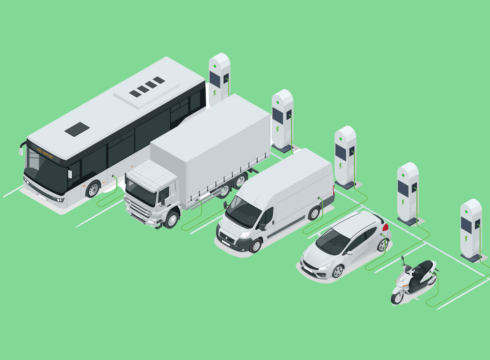The Committee on Estimates expressed concern about the escalation in EV prices if FAME-II scheme was not extended and said it may have a detrimental effect on the long-term growth of EVs
The panel also highlighted the presence of a large number of startups in the EV space and said they would have to shut down if the scheme was not extended beyond FY24
The second phase of the FAME scheme, aimed at incentivising EV adoption by providing subsidies, is scheduled to end on March 31, 2024
Inc42 Daily Brief
Stay Ahead With Daily News & Analysis on India’s Tech & Startup Economy
A parliamentary committee on electric vehicles (EVs) has recommended extending the phase II of the Ministry of Heavy Industries’ Faster Adoption and Manufacturing of Electric Vehicles (FAME) scheme for providing subsidies to vehicle manufacturers.
In its 26th report on the ‘Evaluation of Electric Vehicle (EV) Policy’, the Committee on Estimates said it is concerned about significant price escalation of EVs if the government support is removed.
“The Committee find that a large number of startups are also involved in this field, which may have to shut down once the scheme is closed. It will, therefore, be detrimental for long-term growth that EVs can achieve in the Indian market,” it said in the report.
Hence, the panel recommended that the Centre extend the FAME-II scheme by two years beyond its current deadline of March 31, 2024 to allow more time to evaluate the effectiveness of the scheme and to make necessary adjustments/ modifications to promote EVs.
The second phase of the FAME scheme was initially launched for three years in 2019. Later, it was extended for two more years till FY24 and had a total outlay of INR 10,000 Cr. The scheme aims to support 5 Lakh electric three-wheelers, 10 Lakh electric two-wheelers, 7,000 ebuses, and 55,000 electric four-wheeler passenger cars by providing them subsidies.
As of February 2023, 8.8 Lakh EVs have been supported under the scheme. On the other hand, the government has utilised only INR 1,217 Cr in FY23, till February, as against a total allocation of INR 2,903 Cr for the year.
Before the announcement of Union Budget 2023, the EV industry called for extension of the FAME-II scheme beyond FY24. However, the government didn’t make any such announcement.
Moreover, as per reports, the Ministry of Heavy Industries (MHI) is unlikely to extend the scheme beyond its current deadline.
Recently, Arpit Agarwal, director of Blume Ventures, said at Inc42’s The Makers Summit 2023 that ending the subsidies would slow down adoption of EVs in the country.
It is also pertinent to note that the MHI has also stopped FAME-II incentives for a few two-wheeler EV manufacturers such as Hero Electric and Okinawa Autotech for allegedly claiming subsidies without adhering to the minimum localisation norms. A probe is also on against at least 12 other companies, including Jitendra EV, Ampere Vehicles, Revolt, and Okaya, for the same.
The issue has already hit the sales of electric two-wheelers in the country. From a peak of 77,095 two-wheeler EV registrations in October 2022, the number declined to just 65,955 units in February 2023, as per Vahan data.
Major players like Ola Electric and Ather Energy have also come under the government’s scanner for allegedly taking benefits of FAME-II subsidy by artificially keeping their vehicle prices lower.
The Centre has allocated a total budget of INR 5,172 Cr for FAME-II in FY24. The country currently has a total of 21.7 Lakh registered EVs.
Other Demands To Promote EVs
Besides calling for extending the timeline of FAME-II, the parliamentary committee also urged the government to consider remodelling its subsidy policy for electric four-wheelers. The demand incentive can be increased to INR 15,000 per kWh from the current INR 10,000 per kWh, while the cap can be raised to 40% of the total cost of vehicles from 20% currently, similar to two-wheelers, it said.
The committee also said that the Centre should focus on switching to renewable energy from non-renewable energy sources for power supply as usage of coal would result in the country not meeting its pollution targets.
Besides, the goods and services tax (GST) on EV components and spare parts should also be rationalised, it said.
It must be noted that while GST on EVs has been reduced to 5% from 12%, the industry has been complaining about the lack of clarity on GST for spare parts of these vehicles.
“The committee are of the view that the government should make a comparative study on GST rate on EV vis-a-vis ICE vehicles and their components/spare parts for rationalising GST on EVs and their components,” it said.
It also opined that the number of EV charging stations sanctioned under FAME is very meagre given India has about 63.73 Lakh Km of road network. Under FAME-II, the MHI has sanctioned 2,877 EV charging stations for 68 cities in the country and 1,576 charging stations for nine expressways and 16 highways.
However, out of the 2,877 charging stations, only 1,822 had received Letters of Award as of December 2022, while only 83 out of the 1,576 charging stations were set up on expressways and highways.
The committee called for examining the reasons for the slow pace of installation of the sanctioned charging stations under FAME-II.
{{#name}}{{name}}{{/name}}{{^name}}-{{/name}}
{{#description}}{{description}}...{{/description}}{{^description}}-{{/description}}
Note: We at Inc42 take our ethics very seriously. More information about it can be found here.


